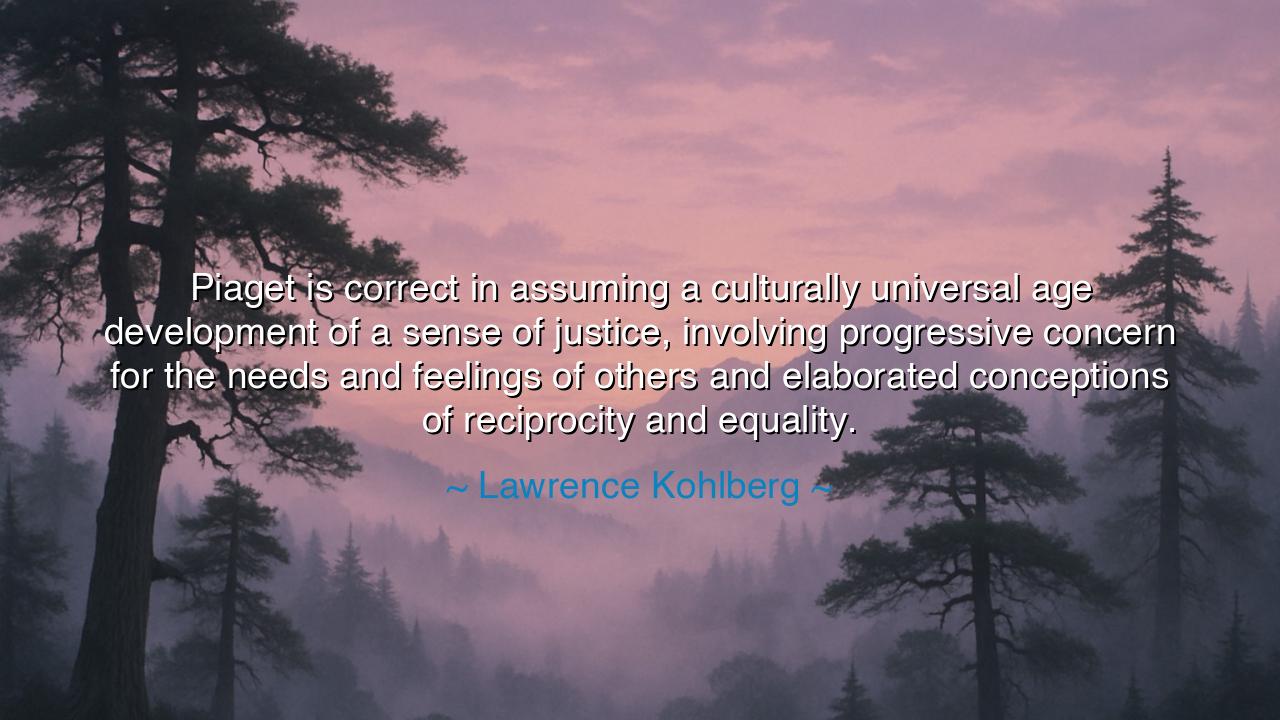
Piaget is correct in assuming a culturally universal age
Piaget is correct in assuming a culturally universal age development of a sense of justice, involving progressive concern for the needs and feelings of others and elaborated conceptions of reciprocity and equality.






“Piaget is correct in assuming a culturally universal age development of a sense of justice, involving progressive concern for the needs and feelings of others and elaborated conceptions of reciprocity and equality.” Thus declared Lawrence Kohlberg, who stood upon the foundation laid by Piaget and built higher towers of moral understanding. These words are not merely for scholars of psychology, but for all who ponder how the soul of a child grows into the conscience of an adult. For Kohlberg reminds us that justice is not taught like arithmetic, but unfolds like the petals of a flower, stage by stage, in harmony with the seasons of human development.
The ancients knew that justice was not an ornament but the core of society. Plato spoke of the just man as one whose soul was ordered rightly, where reason, spirit, and desire each held their proper place. What Kohlberg affirms through Piaget is that this order begins in childhood, with the dawning awareness of others’ needs, and matures into reciprocity—the recognition that fairness is not what benefits oneself alone, but what sustains the harmony between self and neighbor. Just as the child grows in body, so too does the child’s sense of morality expand from self-interest to universal concern.
Consider the tale of young George Washington, who, in legend, confessed to cutting down his father’s cherry tree. Whether true or apocryphal, the story survives because it illustrates the awakening of justice in a child: the recognition that honesty, though painful in the moment, honors the dignity of others and the trust of community. Such stories endure because they remind us of Kohlberg’s truth—that within every culture, children pass through the same stages, moving from fear of punishment, to desire for approval, to finally an abiding concern for principles of fairness and equality.
Kohlberg himself tested this truth through his famous moral dilemmas, such as the story of Heinz, who steals medicine to save his dying wife. When children and adults answer, they reveal not only what they think, but how they reason: the young child may fear punishment, the adolescent may speak of rules, while the mature soul appeals to higher principles of compassion and justice. Thus his research confirmed what Piaget intuited: that moral growth is universal, a path walked by every human being, though at different paces, across all lands and all cultures.
Yet these teachings are not only for the classroom. They are torches to guide societies. For a people that forgets that justice matures with the nurturing of children will find itself governed by citizens whose concern is only for themselves. But a people that cultivates reciprocity, that teaches its youth to see beyond their own gain and to honor the needs of others, will be a people of strength and compassion. In this way, Kohlberg’s words carry the weight of prophecy: if we raise children with hearts tuned to fairness, the world itself will bend toward harmony.
The lesson for us, then, is clear. We must honor the growth of conscience in the young as carefully as we honor the growth of their bodies. Parents, teachers, and elders are the gardeners of the moral spirit, watering it with stories of compassion, pruning it with discipline, and strengthening it with examples of courage and fairness. If we neglect this duty, the plant withers, but if we care for it, it grows strong and bears the fruit of justice.
Practical wisdom follows: speak to children not only of rules, but of reasons. Encourage them to see the feelings of others, to imagine themselves in another’s place. Praise not only achievement, but acts of kindness. Model in your own life the fairness you wish to see in theirs. In this way, you become a living book of reciprocity and equality, written not in ink, but in action.
Thus Kohlberg’s affirmation of Piaget becomes not a dry note in the annals of psychology, but a living truth for every generation: that the human soul, wherever born, carries within it the seed of justice. To cultivate that seed is to shape a humanity that is not selfish, but compassionate; not divided, but united; not unjust, but equal. And when such a humanity stands together, then truly will the ancient dream of equality and reciprocity become the foundation of a just and enduring world.






AAdministratorAdministrator
Welcome, honored guests. Please leave a comment, we will respond soon